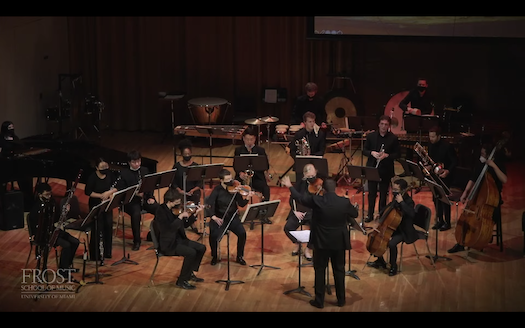Ensemble Ibis fetes León, music from the Americas
Tania León has been an active and important modern composer for decades, not as famous in relative public terms as the likes of John Adams, nor catching any fleeting, fashionable zeitgeist like Mason Bates. She’s just been writing good music, and there was a sense this year when the Pulitzer committee awarded her the composition prize for her orchestral piece Stride, that it was as much for her body of work than single piece.
Saturday night, the University of Miami Frost School of Music’s Ensemble Ibis, directed by Shawn Crouch, gave an in-person and remote-streaming audience a small taste of León’s ideas, values, and place in the concert world. León is the Frost 2021 Distinguished Composer-in-Residence, and in the Maurice Gusman Concert Hall, Ibis played her chamber ensemble work, Indígena and the bassoon and piano duet Pinceladas, surrounding it with works from Marcos Balter, Keiko Devaux, and Roberto Sierra.
Above and beyond León’s presence, the concert had a theme of “Music From the Americas.” That’s an enormous and rewardingly complex topic, impossible to outline in just five pieces. However, the program did offer an alternative view of what classical music from Latin America can be, outside of the type of clichés that audiences might be familiar with from composers such as Copland and Bernstein. León’s music is a window into the true nature of this world.
Indígena was first up. This was also the earliest piece on the program, dated 1997. In several concentrated tableaus, the music explores a kaleidoscope of extroverted moods, mixing dance ideas with post-Stravinsky rhythms, phrases alternating between plunging angularity and lyricism, especially through a prominent trumpet solo, played by Giulia Rath. Unfortunately, the essence and energy of the music never came out in this sluggish performance. The ensemble seemed to be thinking between each note, with no quickness of flow of events, no expression of the spirit of the music.
After this, the concert began to present itself in earnest. The program replaced the standard notes with short introductions from the stage by assistant professor of musicology Dr. Marysol Quevedo, and prerecorded videos in which some of the composers discussed their works. This is still innovative and uncommon, and is always an engaging way to bring the music to the audience, and should be done more often. The only archaic practice that Ibis held onto was putting an intermission in between the first three pieces and last two. Since none of these were long works, the break interrupted the flow and energy of the concert.
Balter’s Memoria for solo cello, played by Kyle Pearl, was next. This was when the concert felt like it really began, with the shaky opening performance and on-stage introductions over with. Built around extended bowing techniques, like harmonics and heavy pressure, the sound of the piece is contemporary but the basics are classic—it’s variation form expressed through timbre, sustained notes transmuted through the possibilities of the cello. Pearl’s performance was expert—he didn’t just manage the technique but played the music through one long line of gripping and beautiful expression.
Graduate student conductor Aden Brooks came out to lead the ensemble in Devaux’s Ebb. This made a satisfying aesthetic connection with Memoria. If the former piece was about how one long line could be varied and parsed, Ebb was about literal waves of sound pressing out toward the listener and then receding. In contrast to the opener, Ibis seemed comfortable with the evocative, and often stimulatingly disorienting waves of sound, coming in sometimes woozy pulses. The music was abstract, but the drama felt concrete.
With Melanie Ferrabone playing bassoon and Audrey Puschinsky at the piano, León’s Pinceladas was much more successful than Indígena. Both musicians played with the litheness and attention to rhythmic accents that the music demands, Through this one could hear the composer’s core ideas, a creative wrestling among fragments of popular rhythms, melodies, and harmonies, and a more abstracted structure that sieves formal ideas through generous open spaces. León is one of the few composers who can convincingly sound traditional and modernist, popular and abstract.
Sierra is another. His chamber piece Cuentos wrapped up the concert. It’s his own friendly, but serious, response to misconceptions about Latin music conveyed through the likes of Bernstein’s “Mambo” (not that Bernstein is bad, but that there’s so much more to the story). What Cuentos does beautifully is deliver the story garbed in provocative gestures that come out of Debussy, Stravinsky, and even Berio. With Crouch again conducting, this was another fine performance, alert and energetic, the musicians confident in Sierra’s beguiling structures and relishing the wonderful colors in his music.
Posted in Performances
Leave a Comment
Sun Oct 10, 2021
at 11:44 am
No Comments
